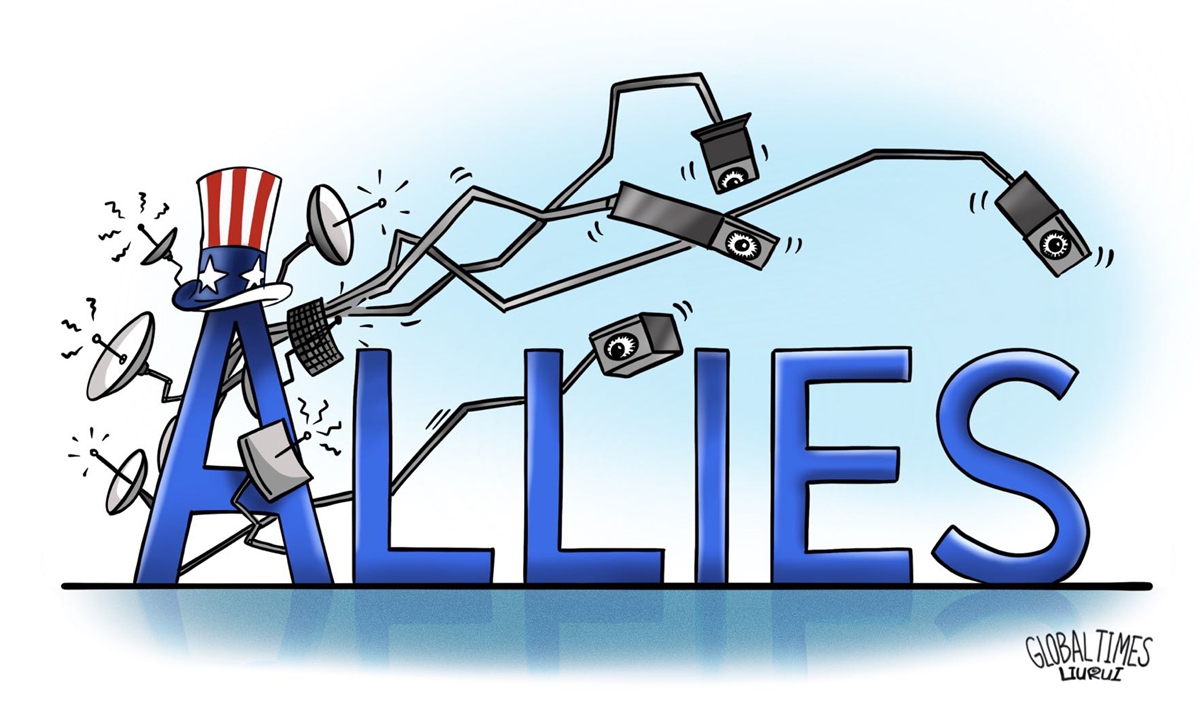
Illustration: Liu Rui/Global Times
A new batch of Pentagon's confidential documents containing American national security secrets has been leaked, leaving Washington on edge in recent days. Because of this accident, the internal operations of US spy activities have been exposed through this "rare window," revealing that the US is not only deeply infiltrating Russia but also has carried out surveillance and eavesdropping on its own allies.
According to documents posted online, at least two discussions about South Korea's internal debates over the Ukraine issue were illegally eavesdropped on by US intelligence personnel. As the saying goes, when one cockroach is found in the light, there can be a thousand more in the dark. The leak indicates that the "true identity" of the US is not clean, and a slight exposure will bring out a pile of dirty things. This is not only a matter of the unsightly and dishonorable private morality of the US, but also a significant "public matter" concerning how other countries, including US allies, perceive and deal with the US.
The South Korean Office of the President on Sunday said that it will "review precedents and instances involving other countries," and "hold necessary discussions" with the US. Frankly speaking, this is almost a perfunctory response to public opinion, which also embodied the helplessness and powerlessness of the South Korean government in the face of illegal monitoring by the US. Among US allies, South Korea is a hardest-hit target of US espionage. On one hand, this is because of South Korea's sensitive geopolitical location. On the other hand, it is also because of South Korea's unequal status in its bilateral relations with the US, mirroring Washington's deep mistrust and disrespect for South Korea's autonomy and rights.
It was exposed at the end of October 2021 that the US' CIA ran a secret office in Seoul to collect South Korean intelligence, triggering uproar in South Korean public opinion, during which the South Koreans denounced the US in anger. However, this matter eventually came to nothing. In recent years, the news of US illegal surveillance of its allies and even the world has been endless, many of which are supported by well-established evidence, but the US has not restrained itself in the slightest, nor has it bothered to give explanations.
Today, the US is so neurotic about its so-called national security, but increasingly indifferent to undermining the security of other countries. It has to be said that the US' such overbearing manner has something to do with the appeasement or connivance of its allies out of complicated considerations. If the US is unscrupulous, it will harm the interests of everyone. Conversely, opposition and protests from allies from the perspective of upholding international order and justice can still be effective against the US. Adhering to principles will win respect, while those holding a candle to the devil will ultimately be hurt by the devil. The history and reality of international relations have provided too many experiences and lessons in this regard.
In addition to the habitual use of intelligence agencies to monitor other countries, since the breakout of the Russia-Ukraine conflict, the US has become increasingly obsessed with engaging in strategic blackmail against other countries by using intelligence which is difficult to tell whether it's true or fake or deliberately exploiting untrustworthy intelligence. In February, without any credible evidence, US Secretary of State Antony Blinken told media that American intelligence suggested China was considering providing arms and ammunition to Russia. The Biden administration used it as a trial balloon for G7 countries to discuss about sanctions against China. In late March, however, Blinken said he did not believe that China has been providing lethal aid to Moscow. These unfounded blackmailing behaviors further exposed the bottomless operations of US intelligence.
A senior US intelligence official called the leak a "nightmare for the Five Eyes alliance," which has many implications worth pondering. Firstly, the US forms cliques by establishing a large US-centered circle with small circles inside it, in which the "Five Eyes alliance" belongs to the core small circle while South Korea is in a relatively peripheral position. The level of trust given by the US to them is also graded and decreased accordingly. Secondly, the core small circle is essentially a group that can play dirty together. The reason why it is a "nightmare for the Five Eyes alliance" is that the dirty work they have done and the secrets shared only within this small circle have been disclosed. Thirdly, the leak has further widened the trust gap within the US' ally system. Although the South Korean government's public response was tepid, it is impossible for Seoul to enjoy being monitored.
Facts repeatedly prove that the US, which believes in the principle of power, is not softer on its allies when it comes to using intelligence as a tool for blackmailing and coercion than it is toward a powerful "opponent." From the notorious former US secretary of state Mike Pompeo praising lying, cheating, and stealing by intelligence agencies as "the glory of the American experiment," to the repeated scandals of the US unscrupulously monitoring allies, opponents, and "enemies," the intelligence community has become one of the most evil symbols of American hegemony. It has not only angered the international community but also made US allies feel like they have a fishbone stuck in their throat. Either way, it is a necessary awakening and upgrade of the perception on the US.




